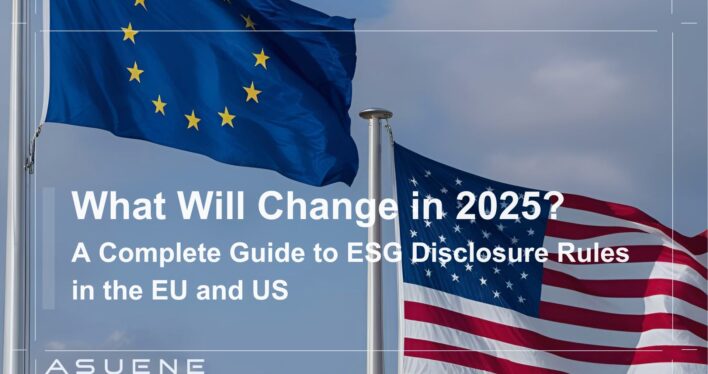- Article Summary
-
The ESG Regulation Wave is Here
2025 marks a pivotal year in the global evolution of ESG (Environmental, Social, and Governance) disclosure. The world’s two largest economies—the European Union and the United States—are enforcing transformative regulations that will reshape how companies disclose sustainability information.
In the EU, the Corporate Sustainability Reporting Directive (CSRD) and EU Taxonomy regulations are setting new standards for transparency. In the US, the Securities and Exchange Commission (SEC) is finalizing climate disclosure rules that will apply to thousands of public companies.
For multinational companies, suppliers, and investors, staying compliant will demand a strategic approach to data, reporting frameworks, and stakeholder communication. This article provides a month-by-month breakdown of the key regulatory changes expected in 2025 and what businesses need to prepare.

EU Regulations: CSRD and EU Taxonomy Timeline
January 2025: First Wave of CSRD Takes Effect
- Companies already under the Non-Financial Reporting Directive (NFRD) must begin reporting under CSRD.
- This includes large listed companies, banks, and insurance firms with over 500 employees.
- Reports must align with the European Sustainability Reporting Standards (ESRS).
July 2025: EU Taxonomy Expanded Scope
- Additional activities will be assessed under the EU Taxonomy (e.g., agriculture, manufacturing, ICT).
- Companies must disclose the percentage of revenue, CapEx, and OpEx aligned with taxonomy criteria.
What Companies Should Do:
- Implement double materiality assessments.
- Align data collection with ESRS metrics.
- Use digital tools for taxonomy alignment and reporting.

US Developments: SEC Climate Disclosure Rule Rollout
Q1 2025: SEC Final Rule Implementation Begins
- Large Accelerated Filers must begin collecting climate-related data for FY2025 (to be reported in 2026).
- Disclosure requirements include Scope 1 and Scope 2 emissions, governance, risk management, and climate-related financial impact.
Q3 2025: SEC Enforcement and Audits Preparation
- Companies will need to prepare documentation and audit trails for emissions and scenario analysis.
- Expect pressure from investors and proxy advisors to go beyond compliance.
What Companies Should Do:
- Establish climate data governance processes.
- Invest in emissions tracking systems.
- Begin scenario analysis aligned with TCFD (Task Force on Climate-related Financial Disclosures).
Global Convergence: How ISSB, GRI, and TCFD Fit In
Ongoing 2025: Integration and Interoperability
- The International Sustainability Standards Board (ISSB) has launched IFRS S1 and S2 standards (governance and climate).
- The EU’s ESRS and ISSB are increasingly aligned to enable interoperability.
- The Global Reporting Initiative (GRI) remains essential for impact-focused reporting.
Business Implication:
- Companies must decide whether to follow a global baseline (ISSB), EU regulations (ESRS), or voluntary frameworks (GRI, SASB).
- Multi-framework mapping is critical for multinational operations.
What to Watch:
- Industry-specific guidance from ISSB
- Progress on assurance standards for ESG disclosures
Strategic Checklist: Preparing for 2025 ESG Disclosure Demands
- Assess Materiality: Conduct double materiality assessments using stakeholder input and value chain data.
- Centralize ESG Data: Use cloud-based platforms for real-time data collection and analysis.
- Upskill Teams: Train finance, legal, and sustainability departments on new standards.
- Coordinate with Suppliers: Begin Scope 3 data requests and offer templates or support.
- Draft Preliminary Reports: Use FY2024 as a dry run to test systems and gaps.
Conclusion: ESG Compliance in 2025 Is a Strategic Imperative
The landscape of ESG disclosure is becoming more structured, enforceable, and globally harmonized. The changes coming in 2025 will not only affect compliance departments but also impact investor relations, procurement, and long-term business strategy.
Companies that prepare now—by aligning with CSRD, SEC rules, and ISSB standards—will not just meet regulatory demands; they will earn trust, secure capital, and build resilient brands.
In the sustainability era, regulation is not the ceiling—it’s the floor. Leaders will go further.
Why Work with ASUENE Inc.?
Asuene is a key player in carbon accounting, offering a comprehensive platform that measures, reduces, and reports emissions, including Scope 1-3, with expertise in decarbonization. Asuene serves over 10,000 clients worldwide, providing an all-in-one solution that integrates GHG accounting, ESG supply chain management, a Carbon Credit exchange platform, and third-party verification.
ASUENE supports companies in achieving net-zero goals through advanced technology, consulting services, and an extensive network.


